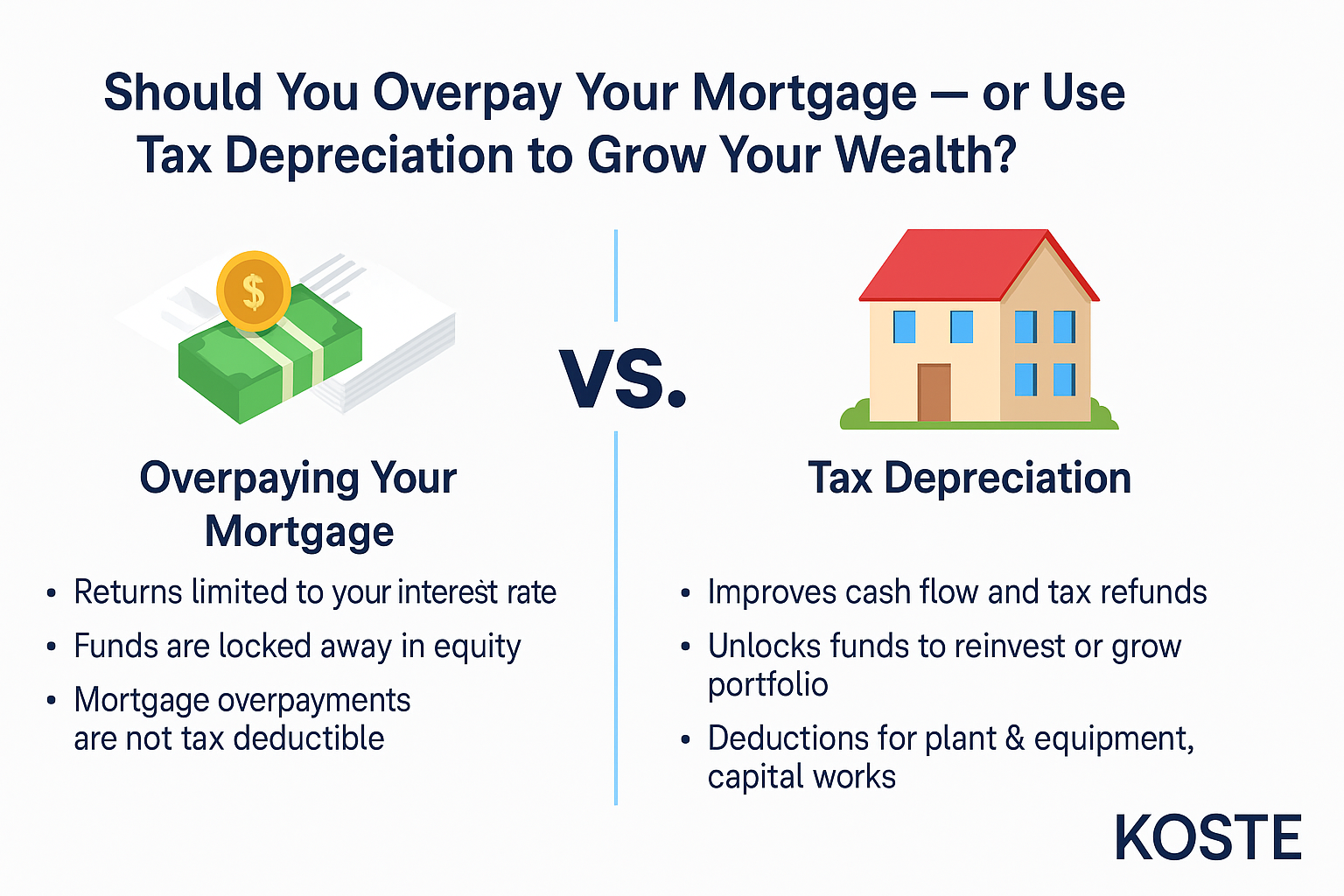
🏠 Should You Overpay Your Mortgage — or Use Tax Depreciation to Grow Your Wealth?
Here’s a bold truth: Overpaying your mortgage won’t make you wealthy — but reinvesting tax savings might.
With Australia’s property market seeing significant capital growth in recent years, the smartest investors aren’t pouring every spare dollar into debt reduction. Instead, they’re unlocking tax depreciation deductions to grow their portfolio, increase passive income, and accelerate wealth creation.
Overpaying Your Mortgage: Feels Safe, But Lacks Leverage
Paying extra on your loan reduces interest and shortens your loan term — but the returns are limited to your interest rate (typically 5–6%). More importantly:
-
These funds are locked away in equity, not available to reinvest
-
You miss opportunities to build leverage and grow your portfolio
-
Mortgage overpayments are not tax deductible
Example: $20,000 in overpayments might save you ~$50,000 in interest over 20 years. But it won’t help you purchase your next property or improve short-term cash flow.
Tax Depreciation: Your Hidden Wealth Engine
Most investors underestimate the impact of tax depreciation — a legal deduction that can return thousands of dollars each year without selling, refinancing, or lifting a finger.
There are two main categories:
-
Division 40 (Plant & Equipment): Items such as appliances, blinds, carpets, and air conditioning
-
Division 43 (Capital Works): Structural elements like brickwork, roofing, tiling, kitchens, and bathrooms
By claiming depreciation:
-
You reduce your taxable income
-
Receive more back at tax time
-
Improve your property’s cash flow
-
Unlock funds to reinvest or grow your portfolio
Example: A single investment property with a Koste tax depreciation schedule can unlock $5,000–$10,000 in deductions annually.
What Do Wealth-Building Investors Actually Do?
Smart investors:
-
Claim every possible deduction
-
Use their tax refund to fund renovations, deposits or reduce personal debt
-
Improve serviceability to expand their portfolio
-
Reinvest into growth assets, not just into shrinking a loan
This creates compounding wealth — something mortgage overpayments rarely achieve.
Which Strategy Wins?
| Strategy | Overpaying Mortgage | Maximising Tax Depreciation |
|---|---|---|
| Return on $10,000 | ~5% interest saved | Often 25%+ return (tax savings reinvested) |
| Liquidity | Locked in loan | Cash in hand (tax refund) |
| Wealth impact | Slower debt reduction | Enables reinvestment and portfolio growth |
| Scalability | Limited | Increases borrowing power |
Mark Kilroy’s Insight:
“Stop overpaying the bank and start building real wealth. Tax depreciation is the most underused opportunity in Australian property investment — and it can fast-track your success by years.”
What to Do Next
Order a tax depreciation schedule — even older properties may qualify, especially with renovations.
Review your tax position annually — ensure your schedule is up to date and you’re claiming correctly.
Reinvest the refund — into your next deposit, improvements, or offsetting your non-deductible home loan.
Speak to a quantity surveyor — to make sure you’re not missing thousands in tax deductions.
Final Thought
Paying down debt is a defensive move. Building wealth through smart, compliant tax strategies is playing offence. If you’re serious about creating long-term financial freedom through property, don’t leave thousands on the table.
Make every dollar work harder — and let Koste show you how.
Maximise property tax depreciation
Get a Free Quote today
Koste are the leading providers of commercial Tax Depreciation reports. Whether you are a tenant completing a fit-out or landlord recently purchasing a property we can help.
